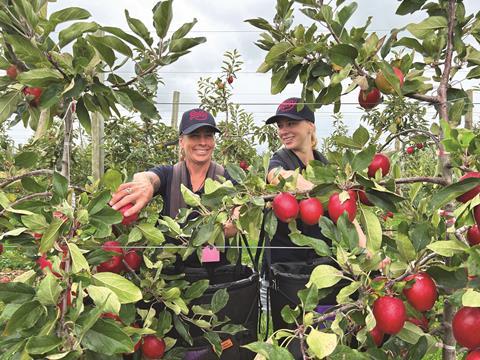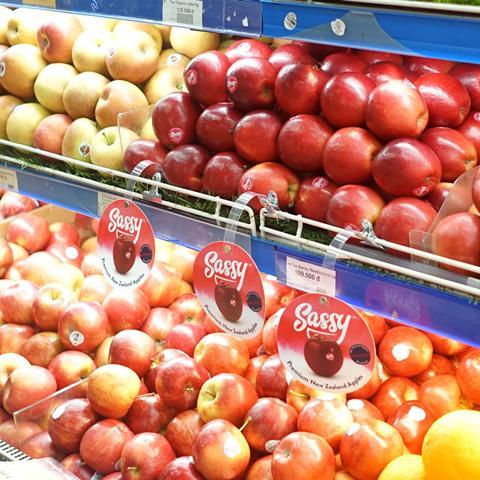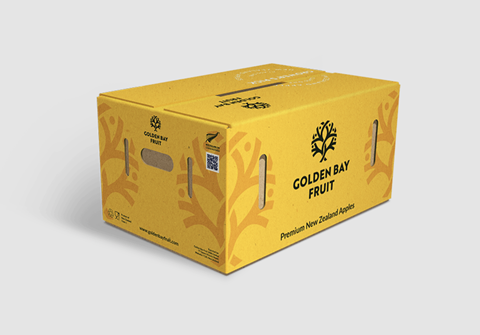As its first new-season apples arrive in Europe, Golden Bay Fruit is set to export more than two million cartons for the first time

Based in Motueka, at the top of New Zealand’s South Island, Golden Bay Fruit has flourished in the post-deregulation era to become one of the country’s leading apple exporters.
As it embarks on another new season, there are plenty of reasons for the company to be optimistic, especially when it comes to selling its fruit in Europe.
One of those is a recently signed free-trade agreement with the EU, which promises better commercial conditions for its products.
In this exclusive interview, Golden Bay Fruit’s commercial manager Patrick Meikle considers what might happen in the next few months.
Patrick, what impact is New Zealand’s free trade agreement with the EU likely to have for the country’s apple export business?
Patrick Meikle: A lot of what New Zealand supplies to Europe is late-season apples. What we supply into Europe is mainly Pink Lady, Jazz and Braeburn. So the fact we will not have any duty coming off that helps a lot. These varieties are already under price pressure, with returns below the cost of production, and planted area is being reduced.
What was the duty?
PM: It was round about 10 per cent. But they didn’t base it on your actual invoice value. It was what they said was the market value. So last year, we were paying over €3,000 a container in duty. But that was only the ones that arrived after 1 August, so later in the season.
First arrivals usually start with a small amount in April, then more volume in May. So you’ve got May, June, July. That was always tariff free. It was only the later season, which is probably about half of what New Zealand supplies.
What we used to try and do was get a big bulk in just before the first of August. But then you end up paying for storage and it can create quality issues. So removing the duty will be much better for both cost and quality management. It means we can run things more efficiently.
How much of a difference can that make for growers?
PM: Growers in New Zealand have had significant extra costs over the last few years. For example, the minimum wage in New Zealand is now over NZ$23 an hour. As an industry we’ve been short of pickers. Golden Bay Fruit has never been short, but like most companies it relies heavily on the RSE [Recognized Seasonal Employer] scheme for harvesting and packing.
Other costs have also gone up: power, sprays, packaging, everything. Freight tripled in cost from three or four years ago, to two years ago. Last year, it went back down by US$2,000. This year it was going to be a lot lower, but then the Red Sea issue came in and all of the shipping lines added two and a half thousand US dollars extra per container. It’s still 50 per cent above where it was before covid.
Could the FTA mean more NZ apples go to Europe in future?
PM: The thing that is going to have more of an impact on the apples this year is that Braeburn stocks in Europe are very low. That’s going to have an effect on Braeburn sales, and we are expecting it should be a reasonably decent market for New Zealand Braeburn.
There’s a stock of Pink Lady in Europe which is all large sizes, and this will have an effect on prolonging the European season. So there could potentially be less demand in Europe. But in the UK, because they want the smaller sizes, we’re expecting a decent demand for Pink Lady.
And as for the New Zealand crop, we’ve had a dry summer. The fruit quality is awesome – the Brix, the pressures, and the colour development, which has been amazing – but the sizes are back slightly. That would mean we have more available for UK and maybe slightly less for mainland Europe.

How is your business in Asia?
PM: As freight rates went up over the last three years, it made business in Asia more attractive because the cost to reach Europe was so high. So New Zealand exporters have developed a business for varieties that were not traditionally suited to Asian palates. We’ve managed to develop a Braeburn business and Pink Lady business into some of those Asian markets.
Has the Asian market for New Zealand apples continued to grow?
PM: Yes. Well, definitely for Golden Bay Fruit. And also, a lot of the older traditional varieties are being phased out as people renew orchards. There’s a lot of focus in New Zealand on new varieties out of the Plant & Food Research and Prevar systems. So, a lot of growth in our production as a country this year came from varieties like Rocket, Sassy, Cherish, Miranda and Dazzle. All of our growth as Golden Bay is coming from our IP varieties, namely Sassy, Miranda, Posh.
What are the prospects for Golden Bay itself? Another record volume?
PM: Yes, we’ll probably export around two million cartons this year of our own fruit. Two or three years ago we were 1.2m cartons, and last year we hit a record 1.7m cartons exported. We’ve had big growth and we are now about 10 per cent of New Zealand exports.
We’re actually one of the few NZ marketers that is still focused on the UK and Europe. For Braeburn, we have about 35 per cent of the New Zealand crop. And Pink Lady is about 35 per cent as well. We are the biggest growers or exporters in New Zealand on both those.
What plans do you have to expand your production further?
PM: We are actively expanding plantings of our own IP varieties such as Miranda and Cherish, which are exclusive to Golden Bay Fruit, and new varieties Sassy and Posh – we own the global licensing rights for these in partnership with Taylor Corp, under a new venture called Next Generation Apples. We’re pretty excited about these protected varieties, and as well as expanding plantings ourselves we have interested parties who will plant these varieties under licence.

When did your first containers depart?
PM: We shipped our first containers at the end of February. One of our new early varieties, Sassy, just arrived in China in late March along with our early pear variety Belle de Jumet. Sassy has received very, very positive feedback.
And how about the first arrivals in Europe?
PM: We had the first arrival into the UK on 11 April, which was Cox. And we ship to Europe direct as well. So, we have arrivals in Rotterdam in April.
We are actually the biggest Cox grower in New Zealand. Some people have pulled it out completely, but we still have about 15 containers. Now that supply for this variety has fallen generally, we are finding a nice niche market for it.








